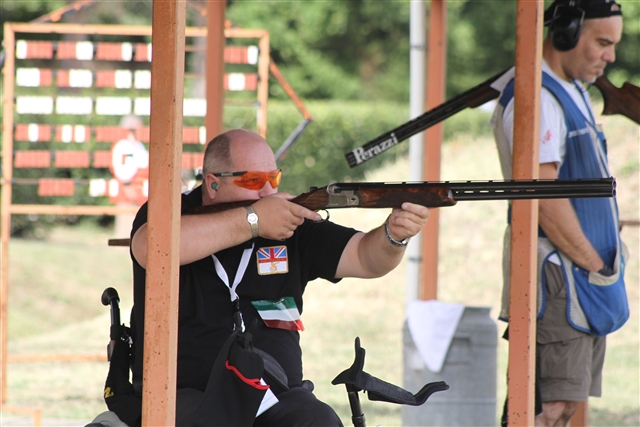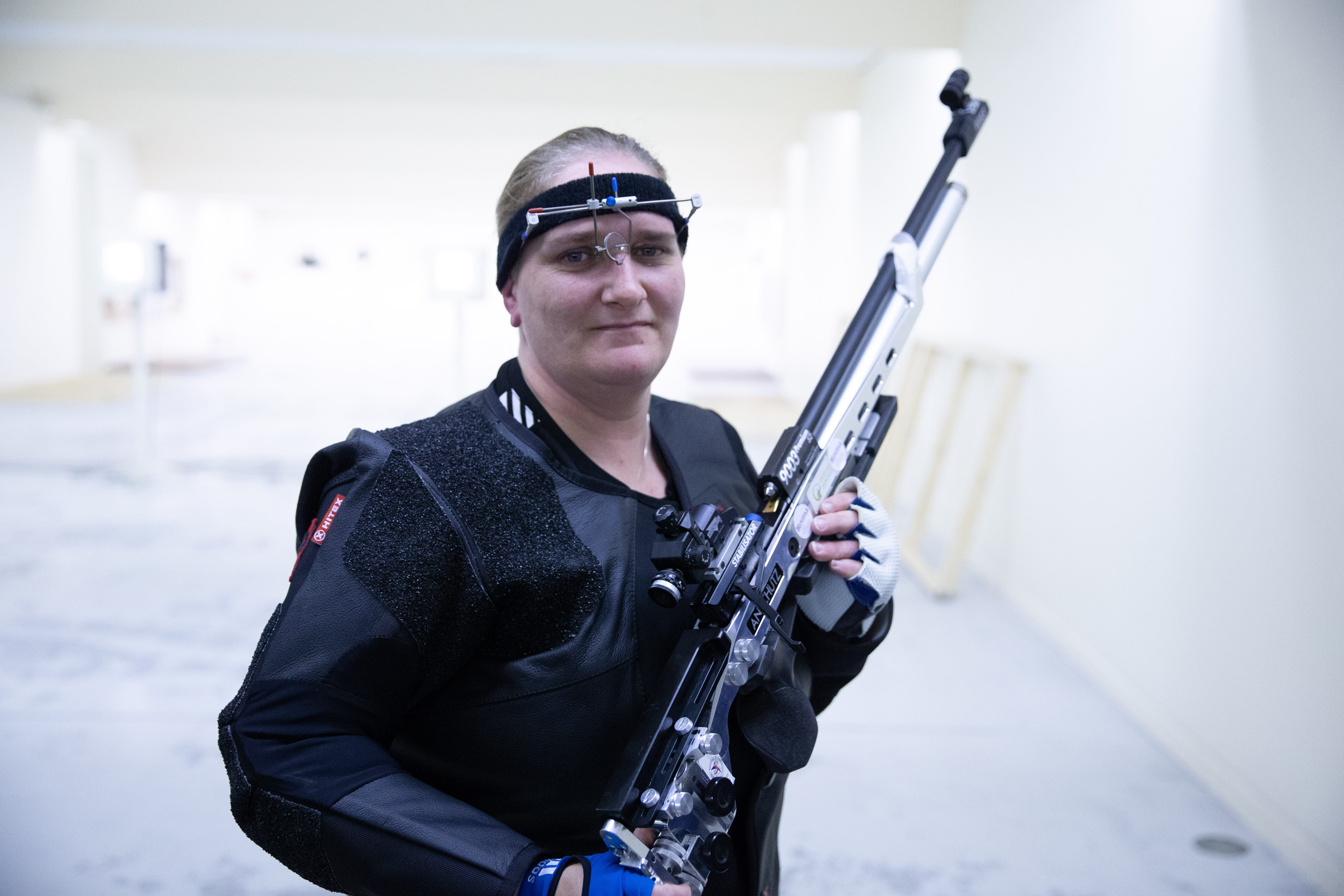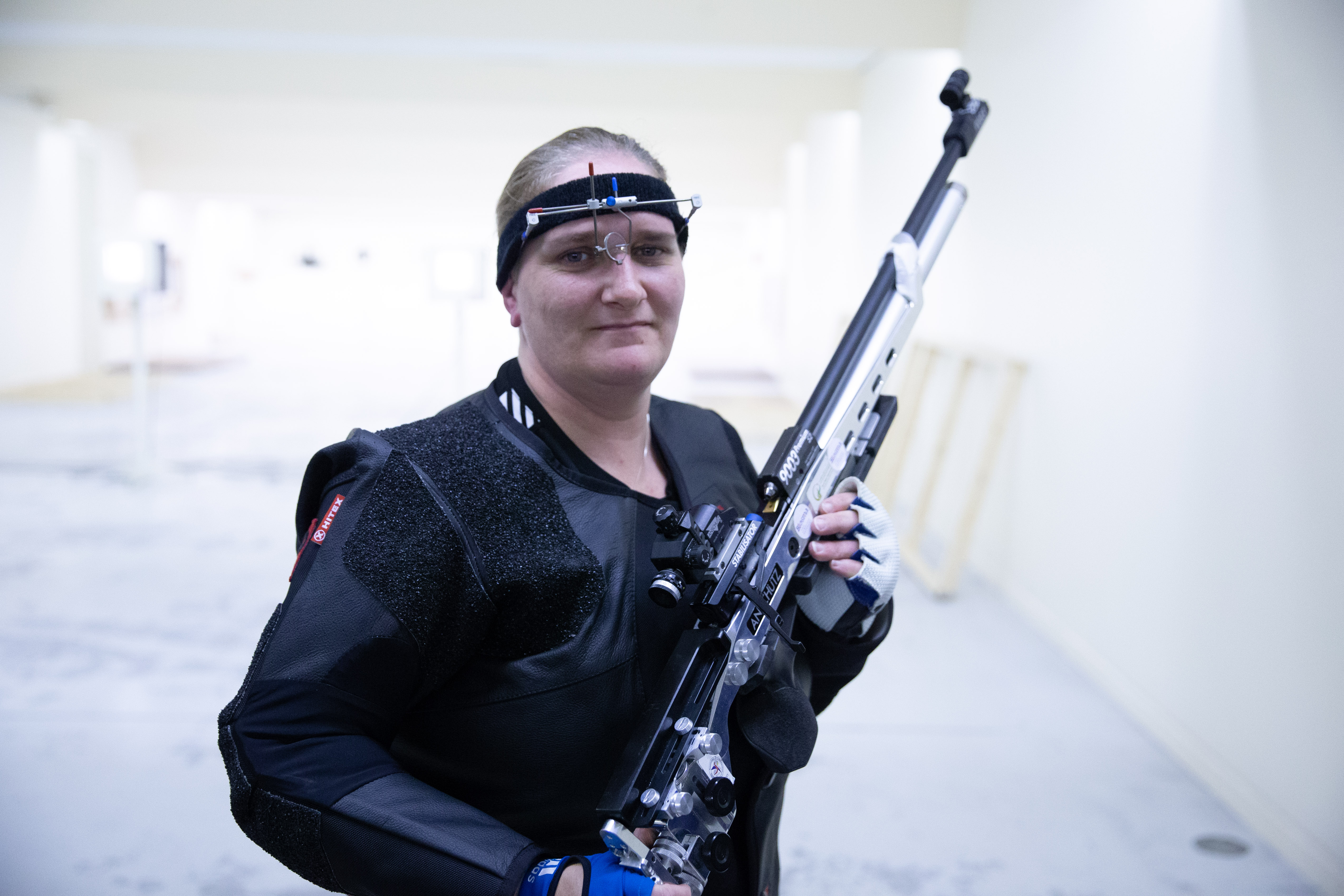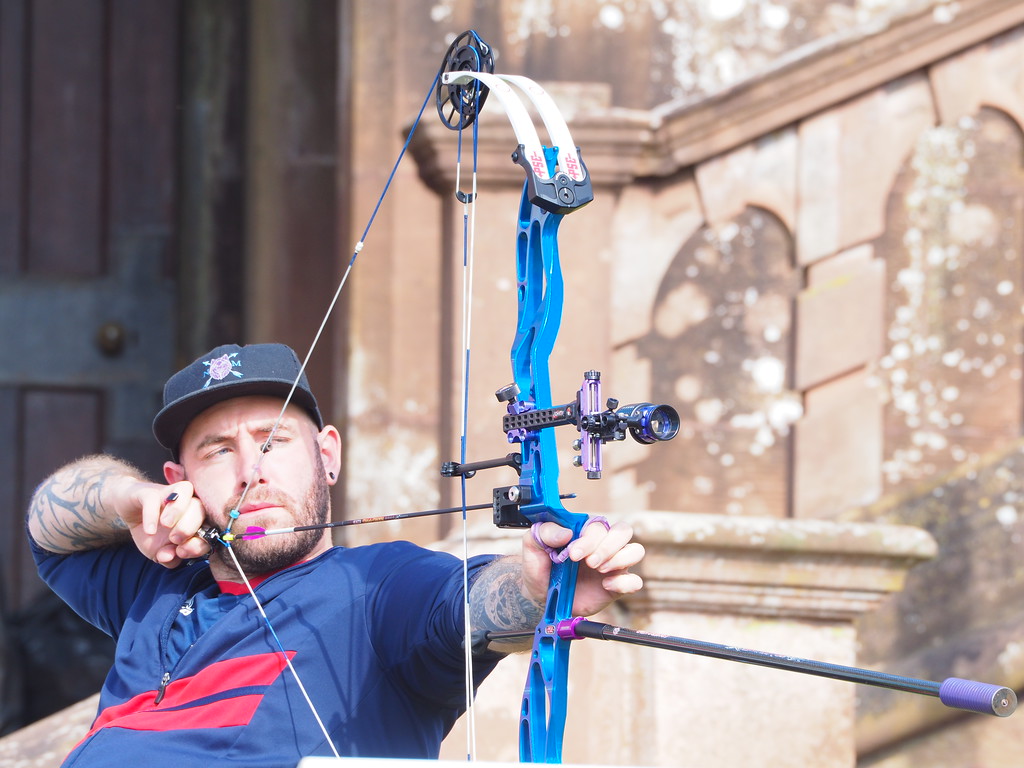Sporting history was made in Lonato, Italy earlier this month when the first Para Trap World Cup was held - with three Scottish shooters taking part.
Michael Drever, originally from Orkney, was one of only two men with upper limb impairments in the 15-strong Great Britain team. He was joined by fellow Scots Allan Ritchie and Keith Shields (pictured above) at the competition from 12-17 September.
In the face of tough opposition, especially from the host nation, the Scots performed strongly.
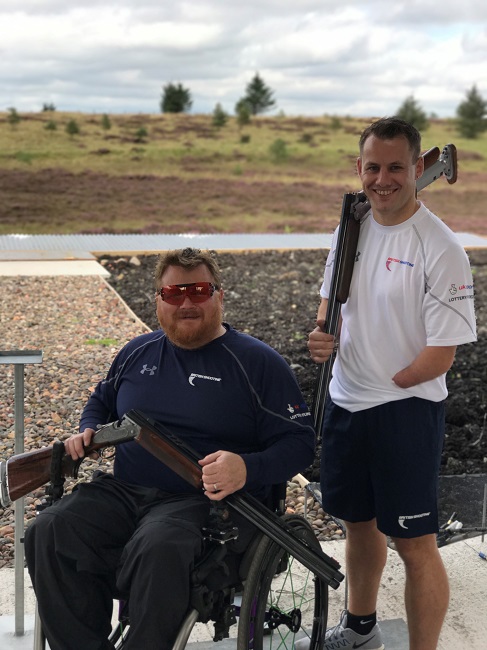 Ritchie (pictured left with Drever) won silver in the PT1 GPMQS SG-S classification with a score of 104 that took him to within two points of gold, while Drever (PT3 SG-U) was 10th with a score of 84 and Keith (PT1 GPMQS SG-S) finished 10th with a score of 80, hampered by eye problems on the day.
Ritchie (pictured left with Drever) won silver in the PT1 GPMQS SG-S classification with a score of 104 that took him to within two points of gold, while Drever (PT3 SG-U) was 10th with a score of 84 and Keith (PT1 GPMQS SG-S) finished 10th with a score of 80, hampered by eye problems on the day.
The World Cup was organised by the International Shooting Sport Federation (ISSF) under the auspices of the International Paralympic Committee (IPC).
Oliver Barsby, COO of Scottish Target Shooting, said: "Scottish Target Shooting is immensely proud of the Scottish athletes selected to be part of the Great Britain Team competing at the first Para Trap World Cup.
"These athletes have done a fantastic job of flying the flag for Scotland, capped off by Allan Ritchie’s superb silver medal.
"With this being the first World Cup for Para Trap we hope it will be the first event of many for Scotland’s para athletes as the discipline builds for inclusion in the Paralympics programme."
In the latest instalment of Our Sporting Lives, Sport First finds out more about the Scots who took part in this landmark World Cup and their sport.
What is para trap shooting?
- Para trap shooting is based on the Olympic trap discipline and is open to athletes who have a physical impairment.
- Athletes use a shotgun to hit 'clays' which are propelled into the air from machines on the ground. Athletes strive to make as many 'hits' (when a clay is broken) as possible.
- Athletes shoot from five central positions on the range, aiming to hit 125 clays in the qualification round and 15 in the final round.
- Shooting is a very inclusive sport as it focuses on technique, concentration and mental strength, enabling athletes of all ages and physical abilities to compete.
How has your sporting journey unfolded?
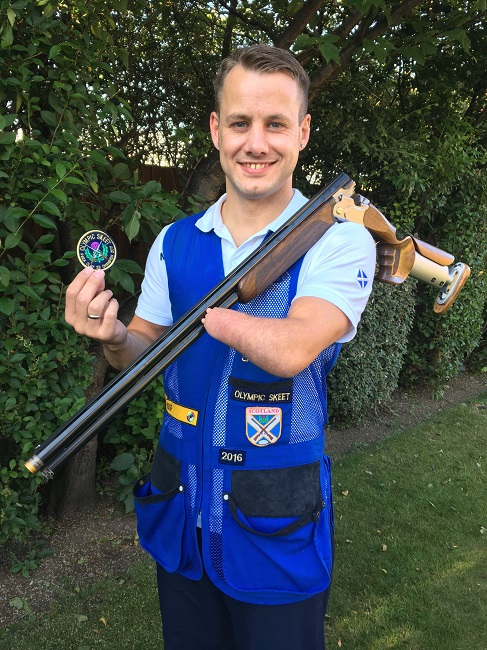 Michael Drever: It was a shooting trip with my father and brothers in Inverness five years ago that rekindled an interest in shooting and I have never looked back.
Michael Drever: It was a shooting trip with my father and brothers in Inverness five years ago that rekindled an interest in shooting and I have never looked back.
I was shooting recreationally for a while, going out when I could, but about two years ago I got to the stage where I'd reached a plateau. That's when I started to shoot competitively in Olympic skeet.
Last year I was selected to represent Scotland at the Home Countries International Tournament in Dublin, an able-bodied competition between the best of Scotland, England, Wales, Ireland and Northern Ireland.
However, it was at the Commonwealth Shooting Federation European Championships in Wales later that year, again representing Scotland, that I first heard about para trap.
The discipline was officially recognised by the International Paralympic Committee and it was announced that the first World Cup would be held in Italy in 2017. I thought I had to go for it and try and get in the team.
I started shooting Olympic trap competitively for the first time in March this year, which meant a change in discipline and the goal of making the Great Britain team.
Allan Ritchie: After a fairly lengthy period of testing, which ultimately resulted in surgical intervention followed by an extended period of hospital rehabilitation, I emerged as a T10/11 incomplete paraplegic.
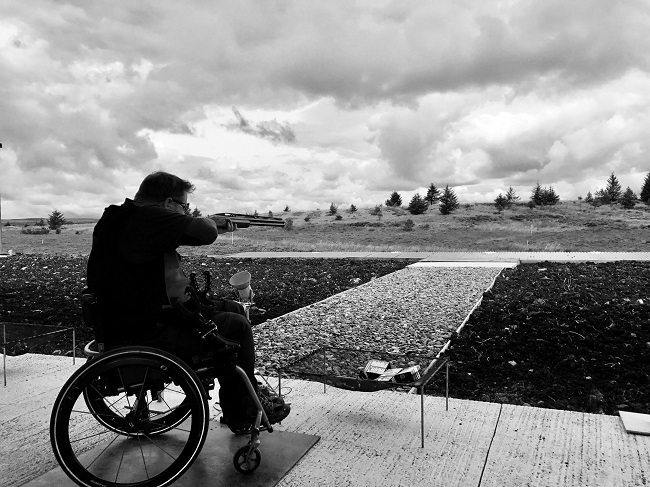 It was a monumental shift in my life which, I will be honest, significantly eroded my self-esteem and self-confidence.
It was a monumental shift in my life which, I will be honest, significantly eroded my self-esteem and self-confidence.
A friend dragged me (almost literally) to shooting in the latter part of 2015. Quite frankly, I was terrified. Was this something else that would be taken from me?
Thankfully it wasn’t, and with a few modifications to safely hold my shotgun I was back out shooting. In April of this year, I heard the Olympic trap had finally been recognised as an IPC sport and the first Para Trap World Cup would be held in Lonato, Italy in September 2017.
That was it: my sporter was put in the gun safe never to see the light of day as I took up the mantle of making the team to represent Great Britain. You could say this was the first real milestone I’ve set for myself.
Keith Shields: When I started shooting again after my accident the sport gave me a reason to live outside of my four walls.
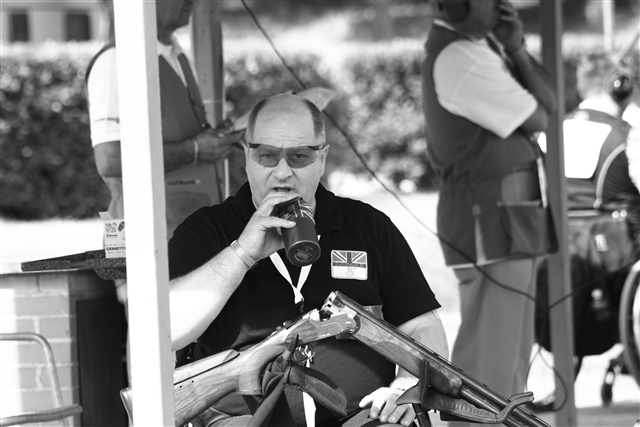
With that and the people I met, it made the disability less of an issue. I had a sport with which I could enjoy and had a passion for.
It has taken eight years to get to where ISSF are now running the first para trap event with plans for this event to be included in future Paralympic Games.
Being a coach means the world to me and I must thank ISSF for allowing me to become the first ISSF shotgun coach in a wheelchair.
It was great to break the mould with passing this course and it makes coaching more accessible because now one person has done it, it shows others that they can too.
Where do you train?
MD: I shoot all over the country and occasionally overseas. It could be Orkney, where I am from originally, the National Shooting Centre Scotland (NSCS), Auchterhouse Country Sports (ACS) or Kippen Gun Club (KGC).
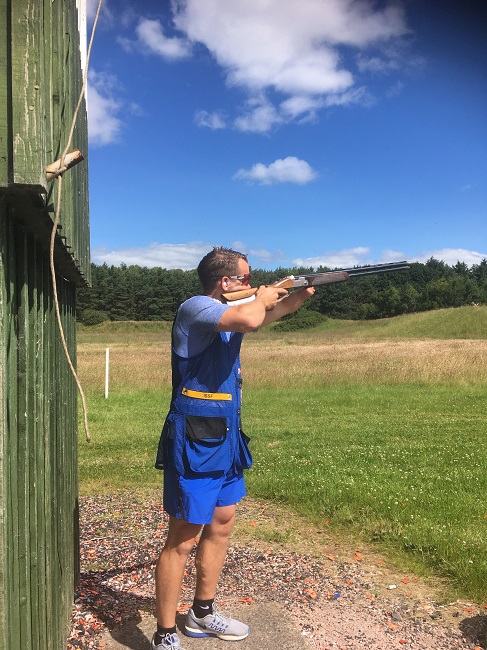 When I am not competing, I train midweek during the summer months at both ACS and NSCS depending on work commitments and either KGC or NSCS at weekends. I currently also train monthly at Nuthampstead Shooting Ground with the Great Britain team.
When I am not competing, I train midweek during the summer months at both ACS and NSCS depending on work commitments and either KGC or NSCS at weekends. I currently also train monthly at Nuthampstead Shooting Ground with the Great Britain team.
There are four grounds in Scotland currently able to offer Para Trap facilities - NSCS, Glenmoriston Shooting Ground, KGC and North Ayrshire Shooting Ground - which is a good variety of grounds and a solid foundation for the discipline to build upon.
AR: I am doing the majority of my shooting at Auchterhouse, normally for midweek practice, and the National Shooting Centre Scotland at most weekends when there isn’t a competition running at one of the other grounds.
Some grounds are better than others for wheelchair access, but the main thing is that they are all receptive to making the changes required to accommodate wheelchair users.
What are your hopes and plans for the future?
MD: Through hard work, dedication and the right support I hope to continue to represent Great Britain and win a Para Trap World Cup. I have had some fantastic support to date and look forward to working more with my personal shooting coach Iain MacGregor.
Disability Sport Fife and Scottish Disabled Sports Trust have both been fantastic since they were made aware of my team selection and provided funding which has greatly assisted in me attending the World Cup event.
My employers, the University of St Andrews have been incredible, providing me with access to the gym and performance suite as well as assistance from strength and conditioning team, time off to prepare properly for the World Cup and provision of training kit.Finally, the continued support from my wife and family which allows me to pursue my goals has been unquestionable. I’m improving all the time and I will continue to push the boundaries in search of excellence. The pinnacle I am pursuing is a podium finish at a Paralympic Games.
AR: My ultimate goal is undoubtedly to represent Great Britain in Para Trap on its inclusion within the Paralympics, whenever that may be.
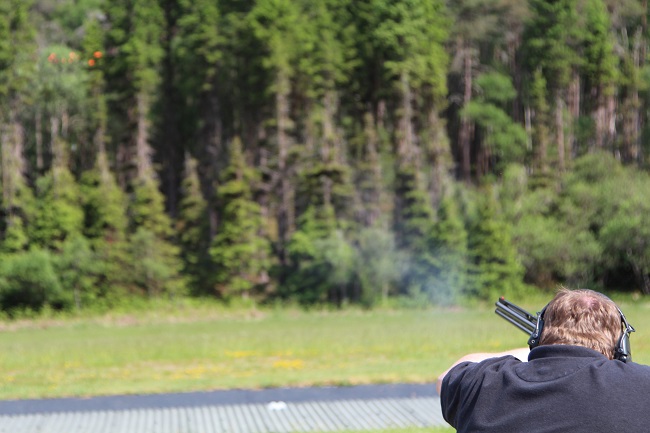
One thing is for sure, the ball is rolling, it’s going to happen and I plan on being there.
In the interim, I’ll keep training and putting as many shells through the gun as I can afford. I’ll attend as many para events as I can and try and get down to England to train with the GB team as much as possible.
KS: My plan for the future is to pass my IOC development course in October, then all being well I will try and go on the ISSF Judge course in January 2018 then onto my ISSF C Coaching Course in March 2018 in Finland.
After that, I want to keep pushing to my ISSF B and A coaching qualifications ensuring that we, Scotland, stay at the front in the development of the sport for disabled athletes.
More about Scottish Target Shooting
Oliver Barsby: At STS we are trying to build pathways, opportunities and partnerships so in the future we can help identify, support and develop others directly and through our member clubs.
Working with colleagues in Scottish Disability Sport we are already in the process of developing training that will support target shooting clubs across Scotland so their members have the confidence and knowledge to make the club fully inclusive.
It is also through this partnership we are working with the Spinal Injury Unit at the Queen Elizabeth University Hospital in Glasgow to provide their patients with the opportunity to try target shooting.
Not only will this provide a physical and fun activity for their patients but the mental skills that are developed subconsciously will help them in all aspects of their life because target shooting really is a sport that everyone can enjoy.
Find out more
If the stories of Michael, Allan and Keith have inspired you, get in touch with Scottish Target Shooting by email or by phoning 0131 467 2489. Alternatively, visit the Inclusive Shooting page on the STS website and complete the enquiry form.
Information on other sporting opportunities for disabled athletes can be found through Scottish Disability Sport. Phone the office on 0131 317 1130, email or visit the website.
Follow the shooters' progress on Twitter via @ScotTargetShooting and @GBShooting.

